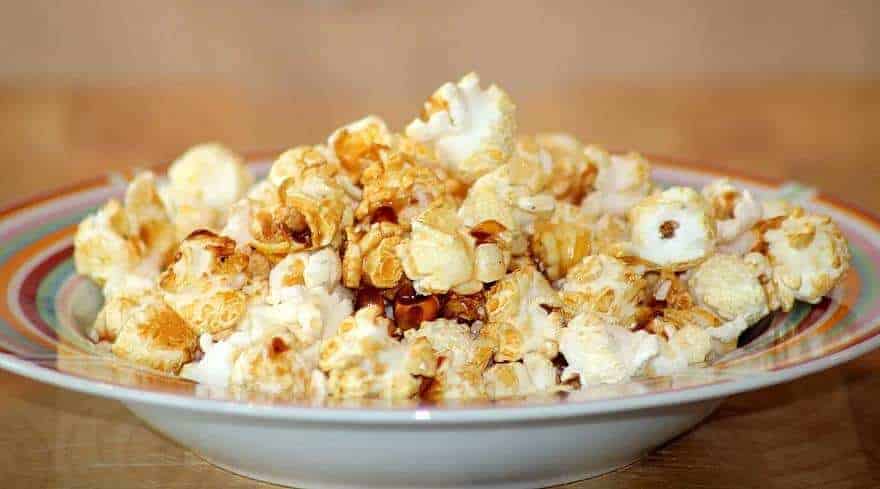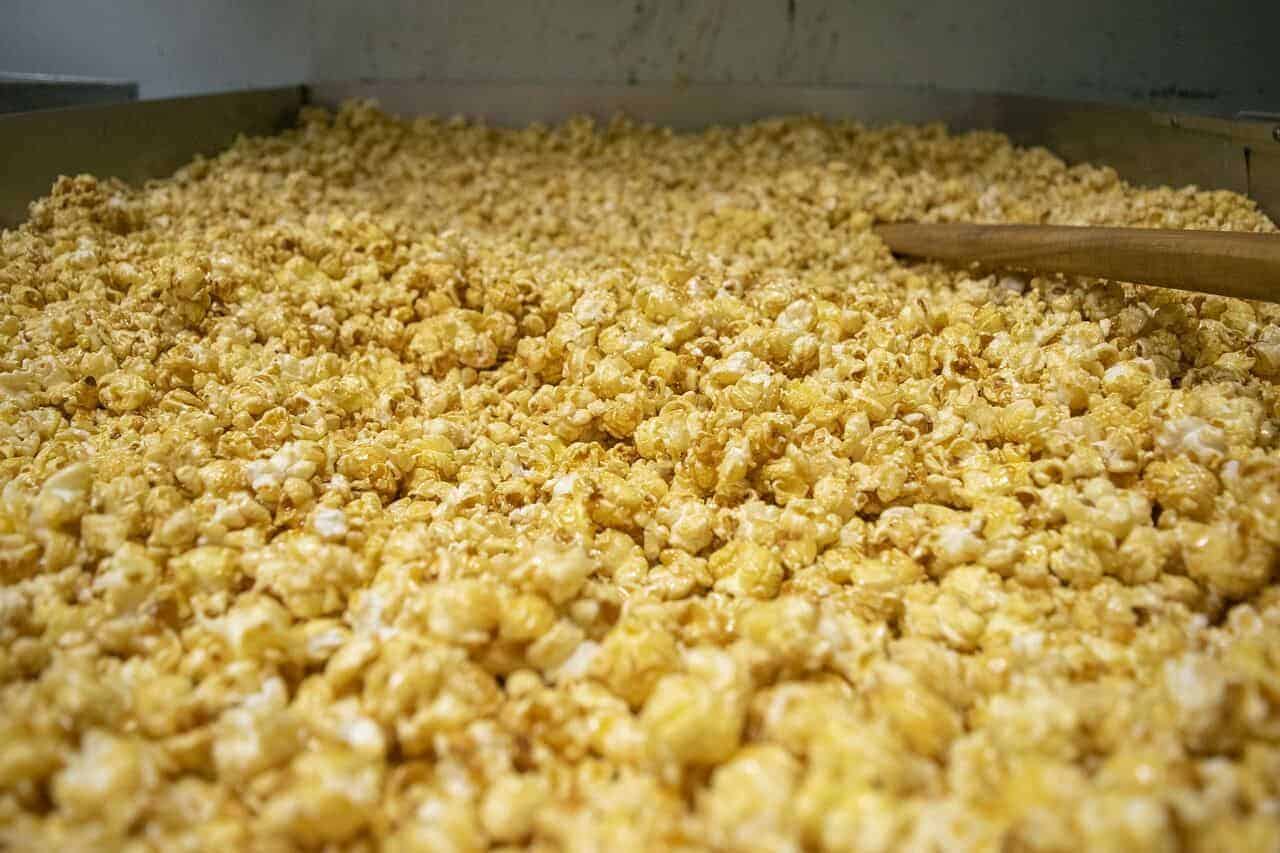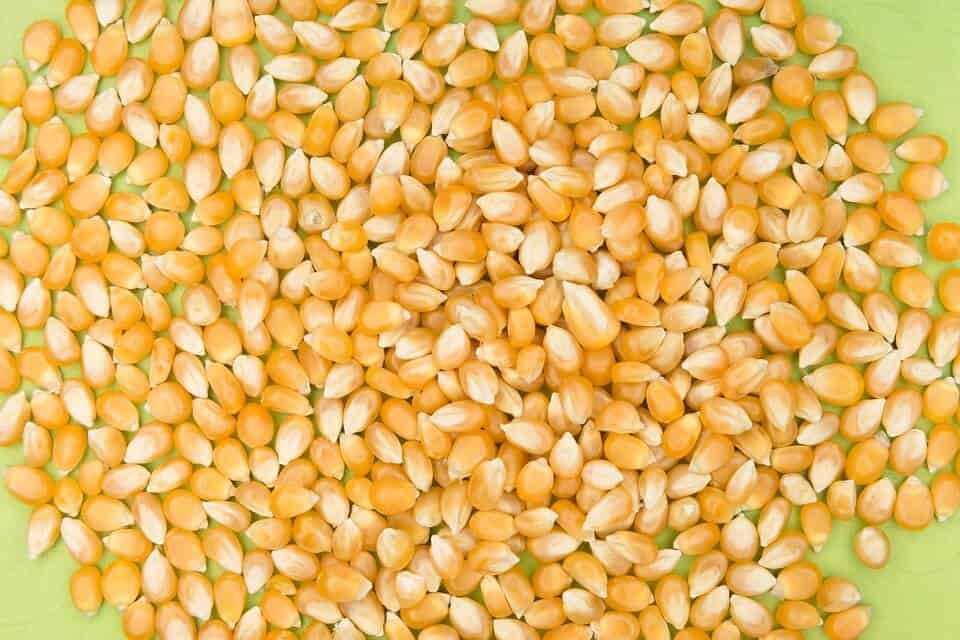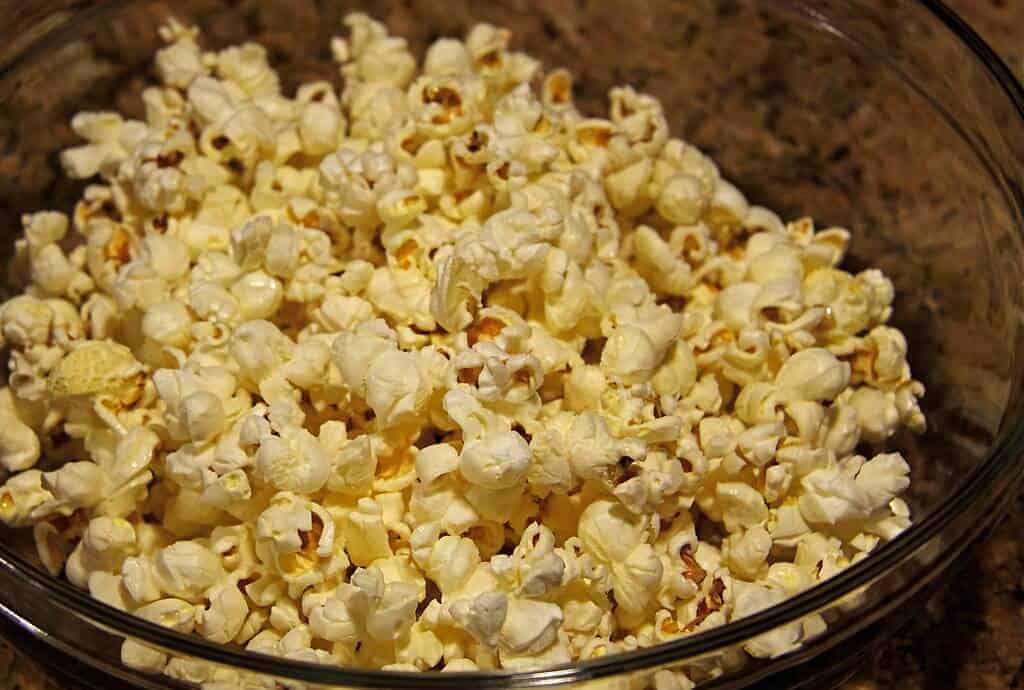What's a movie night without popcorn? Munching on popcorn is part of the movie-watching tradition. Whether it's a big tub of cheese popcorn at the theatre, which costs a bomb, or a bowl of plain salted popcorn when you chill and Netflix in your pajamas - this snack is a must.
We often have big batches of popcorn stacked away. But how long is popcorn good for before it goes bad?
Popcorn is easy to make from dry kernels in a cookpot, using just oil and seasoning. Or, you can make it using the packs of instant popcorn that can be microwaved or popped in a cooker.
If you don't want to go into any trouble at all, you can buy cans of ready-to-eat popcorn. It can last for anything between 4-5 days and 6-8 months, depending on the kind or form of popcorn you have.
How long is popcorn good for - Does Popcorn Go Bad?

The quintessential part of watching movies, popcorn, is everybody's favorite snack. It's light and delicious. The only problem with it is that it vanishes by the end of the movie's opening credits.
There's nothing unnatural about buying microwave popcorn packs, dried corn kernels, or cans of ready-to-eat popcorn from the grocery store when you're out there, picking your grocery.
But, how much of it can go bad after a month or two? What happens to the already popped popcorn that you made and stored in an air-tight container? It all depends on the shelf life of each of the items, which differ drastically.
There are other factors, too, which will play a part in all this, like how you store them, and how you prepare or top the popcorn. So let's take a look:
a) Popped Popcorn Shelf Life
The ready-to-eat popcorn comes in large cans, and the label usually carries a "best before" date. It's usually 2-3 months after the date of production.
Since this is the "best before" date, the popcorn will likely last for a while after the date. However, the quantity of the snack will gradually deteriorate.
Remember that this is true for an unopened can of commercially popped popcorn. Once you open the can, the content inside will last for about 1-2 weeks though the texture will gradually change.
You must store the can in a dry place at room temperature to keep it fresh for the longest time.
b) Homemade Popcorn Shelf Life
Popcorn made at home from dried kernels, with or without oil or butter, is a healthy and fresh alternative.
But it can only last for about 4-5 days after you have popped it if you can manage to store it in an air-sealed container immediately after cooling. Avoid salting it to prevent moisture from affecting its texture.
c) Dry Kernel Shelf Life
Dry kernels are readily available in the market so that you can air-pop a fresh batch of popcorn. They actually have an infinite shelf life.
But it's best to use the kernels within the "best before" date mentioned on the package, which is usually 6-24 months.
Technically, dried corn kernels do not go bad for decades. But they can dry out eventually, and when that happens, they will not pop.
You can try to rehydrate kernels by soaking them in water for a couple of days, and the result might be a little better.
d) Instant/Microwave Popcorn Packet Shelf Life
One of the most common forms of popcorn these days comes in a small packet - in the form of kernels and fat, with some spices.
You just have to pop them in the microwave or pressure cooker for a minute or two. These packs can last for 3-8 months. After that, the fat content or spices will deteriorate.
How Topping Can Affect Popcorn's Freshness

We all love to top our popcorn with some creamy, melted butter. But remember that it can make the popcorn soggy.
The signature crunch in the texture of the popcorn can go missing after a while, and it stops tasting fresh.
So, our advice is to make plain popcorn and add the butter to the small batches that will be served, separately, instead of putting it in the full batch together.
Caramel or chocolate topping can also affect how long your popcorn will stay fresh. In this case, the sweet topping should ideally harden and maintain the crunch.
But then again, if there's too much humidity, the topping may start to melt, and the popcorn will stick together. You should store it immediately after cooling in air-tight containers, or better still, in ziplock bags.
When Popcorn Gets Spoiled
How will you be able to tell if the popcorn has gone bad? There are a couple of stages of "going bad" - the kernels may dry out; the popped popcorn may lose its taste and texture, or they may have become unsafe for consumption.
Check out how to tell if the popcorn has gone bad:
a) Dried Kernels:
Corn kernels contain around 15% water content, which allows them to pop. When there's high heat, this water content inside the corn starts to 'boil', and the kernel turns into popcorn to release steam or pressure within the corn.
If the corn loses this moisture content, it will not pop. However, you must also make sure that it's not close to too much moisture. Otherwise, it will develop molds.
b) Instant Microwave Popcorn
If the kernels swimming in fat and spices inside a pack of microwavable popcorn gets spoilt, you'll notice that the smell is off when you open it.
The package may also be puffy or swollen. In that case, you shouldn't cook or eat that popcorn. Cooking spoiled kernels will also give off a bad smell.
If you find none of these but some kernels don't pop while cooking, the popped ones can still be eaten.
c) Popped Popcorn
As for ready-to-eat popcorn and homemade or microwaved popcorn, you will be able to notice a strange smell and discoloration when it goes bad.
Trust your nose as it can pick up the smell of foods gone bad and notify you. If mold has set in, the popcorn is spoiled.
If none of these occur, but you find that the popcorn has lost its crunch or tastes dry, it's just stale popcorn though it is not unsafe.
Eating Expired Popcorn
Popcorn does not really have an expiry date, as such. The date on the package of commercially popped popcorn kernels is the "best before" date.
This means that the taste and texture of the popcorn deteriorate after the mentioned date. That doesn't mean it expires or becomes unsafe. It still remains edible, though the kernels may not pop, or the popped ones may taste stale.
Eating popcorn made from a batch of kernels that haven't all popped will not make you sick, and neither will soggy popcorn. However, if the popcorn has started to smell bad, or there are molds or signs of contamination, then the popcorn cannot be eaten anymore.
Just like in the case of any other food that has gone bad, popcorn that has gone bad can cause food poisoning.
It is important to note that store-bought popcorn, whether microwavable or already popped, contains artificial flavorings, preservatives, chemicals, and more.
These can cause health issues of many kinds, especially if they start to go bad. So, be careful about store-bought popcorn if you're planning on consuming it after the "best before" date has crossed.
How To Store Popcorn And Keep It Fresh

Storing any kind of popcorn needs similar conditions. Whether it's kernels or already prepared, store-bought or homemade, you must remember to store popcorn in air-tight containers.
You can also keep them in ziplock packets, and it's best to remove as much of the air as possible.
Remember to store kernels, instant popcorn, and popped popcorn at room temperature and in dry conditions, away from humidity or sunlight. Heat and moisture can make ready-to-eat or homemade popcorn soggy or can even cause it to develop molds.
You shouldn't refrigerate or freeze popcorn and kernels either, as it will affect the moisture content of the kernels or kill the crunch of popcorn that's already made.
However, some microwave popcorn packets mention that they can be refrigerated. Check the label to know that.
Remember that once you pop the kernels or open the can of ready-to-eat popcorn, it will lose its freshness quite quickly. So you need to take special care to retain the crunch, taste, and freshness.
It tends to become moist and soggy or develop molds under conditions like cold, heat, and humidity.
Is Popcorn Healthy?
Among the popular snacks we enjoy, popcorn is a healthy choice, especially if you make it at home from kernels. It's a whole-grain gluten free snack that's rich in protein, fiber, vitamins, and minerals.
The fat and carbohydrate content is low, and it has no cholesterol. It is also inherently free from any of the common allergens, including gluten.
However, store-bought popcorn contains lots of flavoring agents, preservatives, fats, and more. So, you need to read the label to know the ingredients in them.
If you suffer from conditions like gluten allergy, sensitivity towards chemicals, etc., the ingredients in the store-bought popcorn can cause serious health problems.
Even if you don't find anything questionable on the label or the list of allergens, it is still better to consume the product in small amounts and observe how your body reacts, especially if you have health issues like Celiac disease, Crohn's or IBS.
Afterall, contamination during the manufacturing process can't be ruled out.
Store-bought popcorn also contains high levels of salt or sodium, which can be harmful to you. It can be bad for your blood pressure.
Some brands may also add sugar, which, as we all know, is not a healthy ingredient at all. They also contain too much fat.
To avoid health problems, the best thing to do is to make your own popcorn at home. Dried kernels are available in the market, and you can pop them to get a fresh batch of popcorn whenever you want.
You don't even need to put oil in it. Just your favorite spices will be enough.
Homemade Popcorn Recipe

Air-popping dried corn kernels to make popcorn is an easy technique. You don't really need any specialized device for that, unlike what the teleshopping ads on TV might have told you.
All you need is a deep-bottom pan and the ingredients - and you're good to go!
The beautiful journey of a kernel's transformation into glorious popcorn is based on a simple mechanism, as explained before.
When the heat is high, the water content inside the kernel reaches the boiling point and causes the kernel to pop, to release the heat building up inside. Thus, it pops and becomes popcorn.
So, heat is all you need to make popcorn. Oil has no part to play in this. However, if you want to add some flavor to the snack, you can add some butter to it.
What you want to add as flavors is upon you, of course. You can add cheese, pepper, chili, or anything else you like.
Check out a simple two-ingredient recipe for healthy popcorn, air-popped at home!
Ingredients:
- Dried kernels - 3.5 tbsp
- Salt - To taste
Instructions:
- Take a large deep-bottom pan that comes with a tight lid. Set it on medium-high heat.
- Once the pot becomes hot, put a few drops of water.
- Now, add the kernels and put the top on.
- Start shaking the pot gently after every 2 seconds.
- Continue the process for 1-2 minutes. You'll hear the popping sound from inside the pot.
- Don't forget to shake the pot at a gap of a few seconds, and listen carefully, until you notice a gap of 3 seconds or more between the pops.
- Remove it from the heat and transfer the content to a bowl. Sprinkle some salt.
Your popcorn is ready to serve. You can jazz up this recipe by adding a tablespoon or so of butter, grated cheddar or parmesan, dried herbs, pepper or paprika, and more.
For a vegan and non-dairy version, you can add any plant-based oil and nutritional yeast, along with the spices of your choice.
If you want to store it, wait for it to cool down first and then transfer it to an air-tight jar or ziplock bag.
Conclusion
Popcorn is a healthy and delicious snack that can be eaten by almost anyone. To keep it safe and fresh, proper storage is the key.
It's likely that old popcorn will not harm your health unless there's mold or contamination. But you won't enjoy the taste and texture of stale popcorn.
Keep it dry, at a neutral temperature, away from air, and have it before the "best before" date to enjoy it at its finest.
